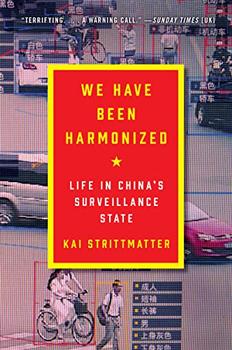Summary | Excerpt | Reviews | Beyond the Book | Readalikes | Genres & Themes | Author Bio

Critics' Opinion:
Readers' Opinion:
First Published:
Sep 2020, 368 pages
Paperback:
Oct 2021, 320 pages
 Book Reviewed by:
Book Reviewed by:
BookBrowse Review Team
Buy This Book
It's a tried-and-tested tactic: steal your enemies' words and make them your own. As George Orwell taught us, freedom then becomes slavery, and ignorance becomes strength. And China is a democratic state under the rule of law. That's what the Party's propaganda says. And it's true: China does have a constitution, Article 35 of which guarantees citizens of the People's Republic "the freedom of speech, of the press [ ...] and of demonstration." There is a "parliament" in China, too: the National People's Congress. There are "elections," and citizens are regularly exhorted to make use of their "sacred and solemn right" to vote.
A long time ago, Lenin invented "democratic centralism": a system in which—so the theory went—democratically-elected functionaries should, once elected, have the privilege of dictating policy without opposition. Mao Zedong later preached the "democratic dictatorship of the people." In practice, centralism and dictatorship always ruled; democracy was a dead husk of a word that stuck in the throats of the population. The subjects of the regime thus experience their "elections," their "sacred right to vote," and their "freedom" as an eternal farce. The words lose all meaning; they have been discredited. In this way citizens are inoculated against subversive influences. When they come into contact with other worlds (a normal part of life for many Chinese people in our globalized age), they will not become infected by dangerous words that represent dangerous ideas. This perverted language makes the population immune. And mute.
Of course, it isn't enough just to occupy the words of others. By the 1940s at the latest, China's Communist Party began creating its own new language for its new humans. Words that had fallen into disfavor were weeded out, and others invented to replace them. Immediately after the People's Republic was founded, Party linguists started work on the Xinhua Zidian, the New China Dictionary. Newly-minted politically- and morally-laden slogans and phrases have never stopped being fed into both the Party discourse and everyday language.
From time to time large sections of the population have enthusiastically adopted the Newspeak as their mother tongue, using it in private as well as public utterances. The Cultural Revolution of 1966–1976 was one such period. It was a cynical and brutal theater of power, set in motion by Mao, who was being marginalized by his rivals within the Party. He called on the country's young people to "storm the headquarters," to rebel against their teachers and professors, their parents, and the Party functionaries who cared more about orderly administration and a functioning economy than they did about permanent revolution. China's boys and girls burned for their messiah Mao, and they were ready to throw off all those trappings of civilization that were left to them: love of their fathers and mothers, and the last vestiges of feeling for their fellow man. By the time they had finished, China lay in ruins.
The very first thing they betrayed was the language of everyday life and common sense. "We were no longer humans," a former Red Guard soldier, now a lawyer, told me during an interview. "We were feral children, raised by wolves. A whole country, a whole generation that had suckled wolf's milk." His first name, Hongbing, means "Red Soldier." The most famous member of the Red Guard was the schoolgirl Song Binbin, a general's daughter who in August 1966, before the eyes of a million other young people, climbed the steps to the Gate of Heavenly Peace to be received by Mao himself. Song Binbin—thick glasses and braids—was permitted to fasten her red armband with its three characters, hong wei bing, Red Guard soldier, onto Mao. Mao asked the girl for her name; Binbin, as in polite and elegant? Yes, she said. "That is not good," said Mao. "Yaowu would be better: warlike." From then on, that was the 17-year-old's name. Poisoned milk, sucked in with poisoned words.
Excerpted from We Have Been Harmonized by Kai Strittmatter. Copyright © 2020 by Kai Strittmatter. Excerpted by permission of Custom House. All rights reserved. No part of this excerpt may be reproduced or reprinted without permission in writing from the publisher.





The Flower Sisters
by Michelle Collins Anderson
From the new Fannie Flagg of the Ozarks, a richly-woven story of family, forgiveness, and reinvention.

The House on Biscayne Bay
by Chanel Cleeton
As death stalks a gothic mansion in Miami, the lives of two women intertwine as the past and present collide.

The Funeral Cryer by Wenyan Lu
Debut novelist Wenyan Lu brings us this witty yet profound story about one woman's midlife reawakening in contemporary rural China.
Your guide toexceptional books
BookBrowse seeks out and recommends the best in contemporary fiction and nonfiction—books that not only engage and entertain but also deepen our understanding of ourselves and the world around us.